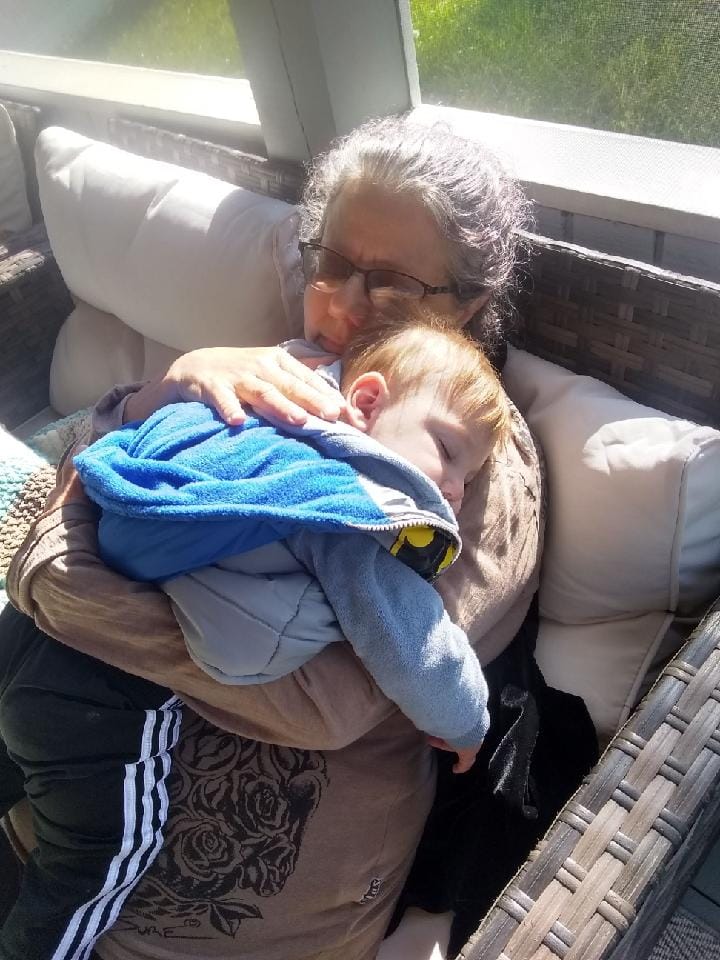Every moment matters.
That’s what it says on the cover of the as-yet unopened 2021 calendar that is ready to hang on my kitchen wall, heralding the next 12 months ahead of us.
It has all of the spaces with numbers on them that tell us the when, but not the what of life. Never was that more clear than in the year that will become infamous for upheaval.
I wrote this on Christmas morning, 2020, in a suburban Philadelphia area town called Dublin, Pennsylvania. Snuggled under the covers, listening to my favorite radio station called WXPN that is playing a unique blend of holiday tunes.
I was able to ease into my day since later in the afternoon, I would be joining my son, daughter-in-law, and 11-month-old grandson in celebrating his first Christmas. Being part of an interfaith family, last week he experienced his first Hanukkah, and his eyes were saucer-wide gazing at the dancing flames on the candles in the menorah that my daughter-in-law requested a few years ago since she wanted to honor my son’s Jewish heritage as well.
~
One of the most important things you can do for your vagina and your sex life—to avoid a world of problems later? Check out this device and get a free bag of craft coffee (code; EJCOFFEE)>>
~
Just a little bit of food prep on my end since my son is a consummate untrained chef. Baked pineapple and homemade cranberry sauce will accompany me there. Gifts are already under their tree that I brought over last night, so that would streamline my schedule today. The Feast of the Seven Fishes, which is part of Lauren’s Italian heritage, was expertly prepared by Adam.
Part of my job, since he didn’t get his love of cooking from me but from his father, who would cook with him, was keeping Dean out of the kitchen, where hot oil was sizzling in some pans on the stove. Good luck with that, since he knows that the kitchen is where all the action takes place and from whence deliciouosity emerges.
He is now eating big kid food to supplement formula, and he seemed to be as eager as the grown-ups were to indulge in the food that was laced with love. Nestled in his high chair, we offered him baby-bite-size pieces, and still, he banged on his tray and clamored for more.
After we were finished eating and I did the dishes (that was always the arrangement in our house, Michael would cook and I cleaned up afterward), we watched Dean scoot around the living room and kitchen on his new little truck given to him by Lauren’s bestie, Jeanette. He laughed with delight and clapped his hands—a newly acquired skill. That he does when he hears music, gets read to, gets sung to, or watches his favorite shows—”Daniel Tiger’s Neighborhood,” “Sesame Street,” and “Curious George.”
Christmas morning, when he awoke to his first present-laden tree, he would see a massive stuffed monkey that I hauled home at my son’s behest. It took up the front seat of my car, as big as a small adult. It would become a lounging and cuddling place for Dean. My heart swells when I think of my little joy boy.
Hard to imagine when I was in my 20s, 30s, and even 40s what it might be like to be a grandmother. I had role models for that in my maternal grandmother Henrietta who I called Giggie (since the family legend is that I couldn’t pronounce anything remotely like grandmom).
She was playful and like a third parent since we all lived together until she died when I was four. When a stroke in her 70s, I’m thinking, had her wheelchair-bound, I recall sitting on her lap and going for a ride. When she passed, my life changed dramatically, because shortly afterward, I was diagnosed with asthma and required medical care.
As I look back on that time, I marvel that my grieving mother was able to step up and take care of my sister and me (Jan was almost two at the time) since she and my grandmother had never been apart.
My dad moved into their house in the Olney section of Philadelphia when he and my mom married in 1956, and when I was a year and a half old, we all moved together to a rancher in Willingboro, New Jersey. Giggie had become everyone’s grandmother in the neighborhood and I was happy to share since she had enough love to go around. My paternal grandmother Rebecca who I called Bubbe, which is Yiddish for grandmother, practiced what I have come to call “smother-love” as she was overprotective—which I attribute to her challenging childhood.
She and her parents crossed the ocean from Russia during the pogrom to escape persecution in what they were told was a land of opportunity, where the streets were paved with gold. She was a marvel who couldn’t read or write in any of the five languages she spoke and had a phone list of 10 or more numbers but no names on it, and cooked “by ear,” as her mother likely did.
My parents became “adult orphans” early on. My mom’s father died when she was 18 and her mother passed when she was in her 30s. My dad’s father died when he was in his 30s and his mother when he was in his 40s. I was blessed to have had both of my parents with me until 2008 (my dad) and 2010 (my mom). Their abundant love for their grandchildren (my son and my sister’s daughter and two sons) has been an example as well. They would have doted on their great grands—eight-year-old Aryanna, 11-month-old Dean, and newborn Sylas.
I couldn’t have conceived of the overwhelming (I don’t even have a word for it) feeling I have when I see Dean learn new skills, turn the pages in his books as he “reads,” and experience his cuddles and baby-babbling. (He carries his books around, as I did when I was a child, as if they were teddy bears.)
The flip side of being old enough to be a grandmother is something I am not thrilled to write about, but it needs to be said since I imagine many readers feel the same. At 62 (most people wouldn’t think so, since I present as youthful and energetic with sometimes purple and currently bright blue-dyed hair), I awaken stiff and achy, have to uncurl my fingers and stretch before getting out of bed. My hands, which used to be dextrous, have a hard time opening the baby-proofed doorknobs, baby-proofed bottles that are filled with my cardiac meds required after a heart attack in 2014, and jars. I need to get one of those rubber jar openers to ease the process.
Since typing is a requirement for my work as a journalist and therapist, I need to keep my hands limber. Massage, warm water, and what I have come to think of as finger-yoga helps. This week, I saw a rheumatologist who told me what I suspected—that I have osteoarthritis. He wants to run labs and have an Xray done of my hands and neck. Oy.
I have always been active, and the thought of a progressive condition doesn’t put a smile on my face, but, instead, a grimace. I workout every day, as my COVID-era gym in my living room is conveniently located. A stationary bike, a mini trampoline rebounder, a huge exercise ball, yoga mat, weights, and a stretchy band are now part of my decor. There are times when I feel like a combination of a kvetchy old lady and Walter Brennan’s character Grandpa Amos in the 1950s-60s show The Real McCoys.
I think about my own parents, who were active in their early 80s. I have a picture of my dad Moish at 65 when they moved to Florida. He is posing in his Speedo, sporting six-pack abs. I attribute that to his daily workouts throughout his life. After retirement in 1989, he worked another 18 years at their town center gym. His doctors told him that the Parkinsons’ Disease that eventually took his life would have been more severe had he not been as active. My mom taught water aerobics and a senior stretch class called “Stretching with Selma” for many years. I know that they were sometimes hobbled with physical limitations, including my mom’s sciatica that required injections and arthritic hands. My intention is to incorporate natural anti-inflammatories, such as ginger and turmeric.
The other distressing aspect of aging is the cognitive challenge I face. I experience the non-clinical, but oh-so-accurate CRS Syndrome. Perhaps you’ve heard of it. It translates to: Can’t Remember Sh*t Syndrome.
There are times when I walk into a room and can’t recall why. A remedy is to go back to where I had the original thought, and suddenly, the light bulb goes off. I have difficulty remembering names now, and if I do recall someone’s name, I can’t always pull up where I met them or who our conduit was.
When writing prompts enter my consciousness, I have to jot them down as soon as the idea comes to me, or it may slip into the ethers. I speak for a living as well. When on stage, people sometimes ask me to repeat something I said and sometimes I can. Other times, I tell them, “Nope.”
I call it channeling when ideas come through me. My husband used to say that I had a “phonographic memory” since I could recall the lyrics of every song I had ever heard. For me, the problem with memory isn’t storage; it’s retrieval.
There are times when I actually feel fear and wonder if there will come a day when I won’t remember my own name or those of loved ones. The good news is that dementia doesn’t run in the family. When my mom was on hospice for congestive heart failure, she would tell me often that she wasn’t losing her marbles.
I assured her that I would retrieve any that rolled under the coach if she did.
I hope that there will be people to fetch mine if I find them going astray.
And a little song that tugs at my heart:
Ready to join?
Hey, thanks so much for reading! Elephant offers 1 article every month for free.
If you want more, grab a subscription for unlimited reads for $5/year (normally, it's $108/year, and the discount ends soon).
And clearly you appreciate mindfulness with a sense of humor and integrity! Why not join the Elephant community, become an Elephriend?
Your investment will help Elephant Journal invest in our editors and writers who promote your values to create the change you want to see in your world!
Already have an account? Log in.
Ready to join?
Hey, thanks so much for reading! Elephant offers 1 article every month for free.
If you want more, grab a subscription for unlimited reads for $5/year (normally, it's $108/year, and the discount ends soon).
And clearly you appreciate mindfulness with a sense of humor and integrity! Why not join the Elephant community, become an Elephriend?
Your investment will help Elephant Journal invest in our editors and writers who promote your values to create the change you want to see in your world!
Already have an account? Log in.

 Share on bsky
Share on bsky







Read 6 comments and reply